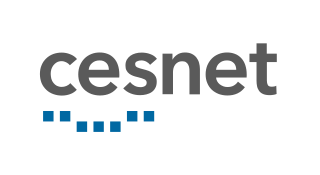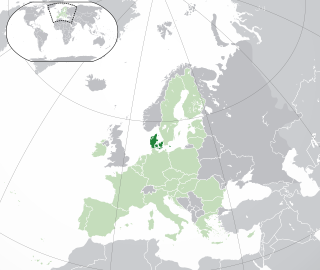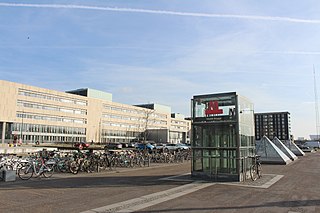Related Research Articles

Chalmers University of Technology is a private research university located in Gothenburg, Sweden. Chalmers focuses on engineering and science, but more broadly it also conducts research and offers education in shipping, architecture and management. The university has approximately 3100 employees and 10,000 students.

The University of Copenhagen is a public research university in Copenhagen, Denmark. Founded in 1479, the University of Copenhagen is the second-oldest university in Scandinavia after Uppsala University.

Internet2 is a not-for-profit United States computer networking consortium led by members from the research and education communities, industry, and government. The Internet2 consortium administrative headquarters are located in Ann Arbor, Michigan, with offices in Washington, D.C., and Emeryville, California.
CARNET is the national research and education network of Croatia. It is funded from the government budget and it operates from offices in Zagreb and five other cities.

The Big Ten Academic Alliance (BTAA), formerly the Committee on Institutional Cooperation (CIC), is the academic consortium of the universities in the Big Ten Conference. The consortium was renamed on June 29, 2016.
NORDUnet is an international collaboration between the National research and education networks in the Nordic countries.

SITA is a multinational information technology company providing IT and telecommunication services to the air transport industry. The company provides its services to around 400 members and 2,500 customers worldwide, which it claims is about 90% of the world's airline business. Around the world, nearly every passenger flight relies on SITA technology.
Statistics Denmark is a Danish governmental organization under the Ministry of the Interior and Housing, reporting to the Minister of Economic and Internal Affairs. The organization is responsible for creating statistics on the Danish society, including employment statistics, trade balance, and demographics.
The Deutsche Gesellschaft für Internationale Zusammenarbeit (GIZ) GmbH, often simply shortened to GIZ, is the main German development agency. It is headquartered in Bonn and Eschborn and provides services in the field of international development cooperation and international education work. The organization's self-declared goal is to deliver effective solutions that offer people better prospects and sustainably improve their living conditions.
The International Relations and Security Network (ISN) was part of the Center for Security Studies (CSS) at the Swiss Federal Institute of Technology, which is located in Zurich, Switzerland. It was an online information service that provided a range of open access products and resources that concentrated on international relations (IR) and security studies. In 2016, the ISN ceased to be a stand-alone project and was fully integrated into its parent organization as CSS Resources.

CESNET is developer and operator of national e-infrastructure for science, research, development and education in Czech Republic. The CESNET association was founded in 1996 by Czech public universities and the Academy of Sciences of the Czech Republic. An important part of CESNET's activities is research of advanced network technologies and applications from hybrid networking, programmable hardware, metacomputing to middleware and video transmissions. CESNET fulfils the role of NREN within the Czech Republic and represents it in international organisations such as the GÉANT Association, EGI and GLIF. CESNET is involved in the implementation of the European backbone network project called GÉANT. Within the Czech Republic CESNET fulfils the role of a coordinator of large infrastructures involved in the field of information technology.

The University of Łódź is a public research university founded in 1945 in Łódź, Poland, as a continuation of three higher education institutions functioning in Łódź in the interwar period — the Teacher Training Institute (1921–1928), the Higher School of Social and Economic Sciences (1924–1928) and the local division of the Free Polish University of Warsaw (1928–1939).

In an international context Denmark is viewed as a somewhat peculiar country when it comes to internet access. The former state owned telephone company TDC owns the entire last mile infrastructure in terms of copper telephone lines and the vast majority of the coaxial cable infrastructure as well. Even though the Danish telecommunications infrastructure is very heavily dominated by one company, Danish internet customers still enjoy fair prices and a wide availability of different next generation access internet connections in comparison with most other EU countries. Furthermore, TDCs de facto monopoly on last mile infrastructure has come under attack. In the last decade regional power companies have formed national business alliances aimed at implementing FTTH for private and business end users.

The Royal School of Library and Information Science is a school under the University of Copenhagen that provides higher education in the field of library and information science. It has now merged with another department to Department of Communication. It is based in Copenhagen, Denmark. It is a member of iSchools, a consortium directed to understanding the role of information in nature and human culture. There has also been a location in Aalborg, however this campus was shut down in the summer of 2017.
The Suranaree University of Technology is a national public university in Nakhon Ratchasima Province, Thailand. The university was established on 27 July 1990, becoming fully operational in 1993.

The National Library of Economics is the world's largest research infrastructure for economic literature, online as well as offline. The ZBW is a member of the Leibniz Association and has been a foundation under public law since 2007. Several times the ZBW received the international LIBER Award for its innovative work in librarianship. The ZBW allows for access of millions of documents and research on economics, partnering with over 40 research institutions to create a connective Open Access portal and social web of research. Through its EconStor and EconBiz, researchers and students have accessed millions of datasets and thousands of articles. The ZBW also edits two journals: Wirtschaftsdienst and Intereconomics.

Harokopio University of Athens, HUA is a public research university based in Kallithea, Athens, Greece.

Arctic cooperation and politics are partially coordinated via the Arctic Council, composed of the eight Arctic nations: the United States, Canada, Iceland, Norway, Sweden, Finland, Russia, and Denmark with Greenland and the Faroe Islands. The dominant governmental power in Arctic policy resides within the executive offices, legislative bodies, and implementing agencies of the eight Arctic nations, and to a lesser extent other nations, such as United Kingdom, Germany, European Union and China. NGOs and academia play a large part in Arctic policy. Also important are intergovernmental bodies such as the United Nations and NATO.
A library consortium is any cooperative association of libraries that coordinates resources and/or activities on behalf of its members, whether they are academic, public, school or special libraries, and/or information centers. Library consortia have been created to service specific regions or geographic areas, e.g., local, state, regional, national or international. Many libraries commonly belong to multiple consortia. The goal of a library consortium is to amplify the capabilities and effectiveness of its member libraries through collective action, including, but not limited to, print or electronic resource sharing, reducing costs through group purchases of resources, and hosting professional development opportunities. The “bedrock principle upon which consortia operate is that libraries can accomplish more together than alone.”
Belarus Space Agency, officially known as National Agency for Space Research is a governmental body that coordinates all Belarus space research programs with scientific and commercial goals. It was established in 2009. It is closely associated with the National Academy of Sciences of Belarus, which was responsible for Belarusian space travel until the foundation of the Belarus Space Agency.
References
- ↑ "Forskningsnettet - The Danish Research Network". DeIC, Danish e-Infrastructure Cooperation. Archived from the original on 2016-08-16. Retrieved 2016-06-29.